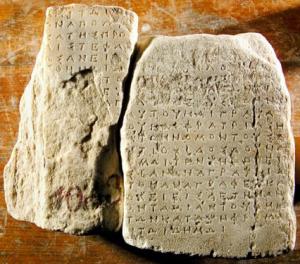With Native American languages around the world being lost, preserving the Quileute language is important. Today the Quileute tribe’s put forth efforts not only save the language, but reinvigorate it:
“[In 2007], the Tribal Council set up a two-year Quileute Revitalization Project with the goal of encouraging the use of Quileute words and phrases in everyday village life. A basic vocabulary of greetings, questions, numbers, names of things, and “one-linders” in Quileute were made available to tribal members and staff through informal classes, email and computer CDs.”
 Some of the first steps to learning a new language are not that dissimilar from a child learning to speak. Learning to say the Quileute word for mother or some other chosen one is the first step at putting these words into phrases for useful communication.
Some of the first steps to learning a new language are not that dissimilar from a child learning to speak. Learning to say the Quileute word for mother or some other chosen one is the first step at putting these words into phrases for useful communication.
To make things easy below is a list of words and phrases with their Quileute pronunciation. I’d start with a few words or phrases write them down and say the Quileute word several times a day. When you have the word committed to memory move on to the next word or phrase.
Learning the Quileute Language can be a way of preserving their sense of cultural and heritage. You can learn to speak Quileute.
Visit this page often (you might want to bookmark this page) as I’ll continue to add more words and phrases for you to study in the upcoming days.
Learn to Speak Quileute
[hah-ch chee-EH] “Good morning”
[hah-ch toe-CHOKE-tee-yuh] “Good afternoon”
[hah-ch uh-WAY] “Good night!”
[uh-YAH-so-CHUH] “How are you?” (-cha, said to a man)
[uh-YAH-so-CHID] “How are you? (-chid, said to a woman)
[HAH-ch-lee Ho] “I’m good/well”
[HATE-kwoh-lee] “I’m sick”
[yah-po-tahl-lee] “I’m tired”
[hay-LAH-uh-lee] “I’m grouchy”
[yup-THOH-oh-lee] “I’m hung over (also, I’m drunk)”
[WAH-shay-th-lee tick-thoh-oh-wah] “I’m going
crazy!”
[hah-HECK-tee-yuh] “today” [fqxi-here, now; -ktiya-day]
[uh-YAH-so-CHUH hah-HECK-tee-yuh] “How are you today?”
[HATE-kwoh-lee hah-HECK-tee-yuh] “I’m sick today”
[KAY-h-kuh] “Go away, Get away from me. Get outa here.”
[wuhs ho] “No way!”
[wuhs tuh-huh-KWAH-say] “Not so hot! “
[chee-tuh-KAY-do] “He’s/she’s/it’s a killer!”
[ah-thlah-CHUH to a man or –CHID to a woman] “What are you doing?”
[pah-KATE-lee] “I’m working.”
[TSAH-thlee] “I’m not doing anything.”
[quo-oh-KAY-th-chuh to a man, or –chid
to a woman] “Where are you going?”
[pah-kate-KAY-th-lee] “I’m going to work.”
[POKES-kay-thlee] “I’m going to Forks.”
[TAY-hwah-lee] “I’m going home.”
[hah-CHAH-th hah-hECK-tee-yuh] “Good weather today.”
[buh-SAH-th hah-HECK-tee-yuh] “Bad weather today.”
[CHAY-shuh hah-HECK-tee-yuh] “It’s windy today.”
[WAY-th] “one”
[THAH-oo] “two
[KWAH-uhl] “three”
[BAH-uh-yahs] “four”
[TAH-see] “five”
[EH-sh] “many, a lot”
[luh-KAH] “not many, a few”
[HAH-ch – buh-SAY] “Good –vs- bad (anything good: delicious, handsome, nice – versus – anything bad: naughty, sinful, worthless)”
[Tuh-HAH – hwOH-s] “hot -vs- cold (weather)”
[tuh-HAH-lee – keh-EE’ee-lee] “I’m warm –vsperson is feeling rather than the weather)”
[thuh-BAY-tee – hah-YAH-kuh] “strong -vs- weak”
[wiss-SAH – HATE-cool tah-THAY-tuh-lee] “happy –vs- sad (heart-sick)
[huh-BAH – TSAH-duh] “all –vs- none”
[KWOH-hwuh – BOH’oh-tuh] “skinny vs- fat”
[WAY-loh-oht – BOH-ts] “long –vs- short”
[HUH-hay] – “now (but also here)”
[hw-PA (as in hat)] – “in a little while, soon”
[chee PA (as in hat)] – “ a while ago”
[tsuh-DAH – THLOH-hwah-duhs] “young –old (of people)”
[TSAH-tuh – HAY-tuh-bah] “new – old, worn ou (of things)”
[ah-YAH-so-chuh or chid] “How are you?”
[ah-th-lah-CHUH or CHID] “What are you doing?”
[quoh-oh-KAY-th-CHUH or CHID] “Where are
you going?”
[SHAY-puh] “black”
[THLOH- puh] “r79pa means blue or green “
[PAY-chuh] “red”
[kuh-BAH-thluh] – “white” (but not White man….see A
below)
[pay-THLAY-so] “yellow”
[kuh-LAY-so] “brown”
[kwoh-LAY-yoh-t!] “Quileute”
[HAY-stuh AH-lit-uh] Give me something to eat (food) or Give me a fish.
[HAY-stuh TAH-see] Give me Five! (i.e. a “high five”)
[HAY-stuh TAH-luh] Give me a dollar or give me money
[HAY-stuh LAHB] Give me something to drink (i.e. alcoholic – lab is from “rum”)
[HO-quaht] “a non-Indian, usually White, but a black is a ship-h9k2at (a black non-Indian)”
[POH-ohk] “an Indian (male or female, not nec. Quileute)”
[WAH-lee tah-chuh-AH] “I don’t know.”
Quileute Words
blue jay is “kwáshkwash”
woman is “Wisatsu’upat.”